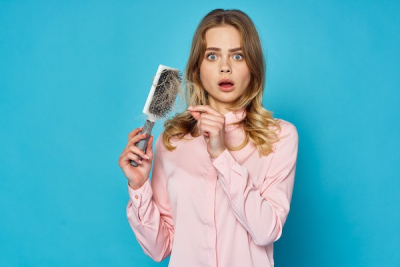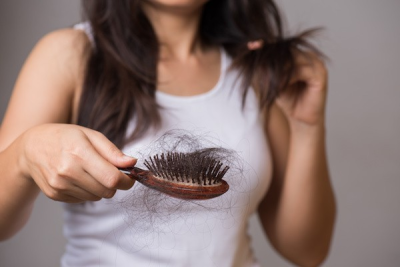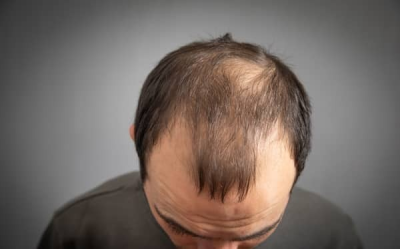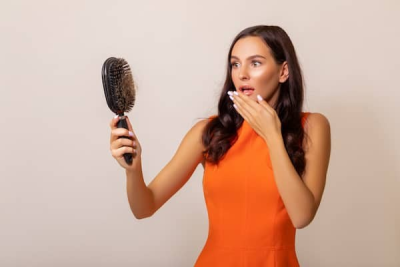How to fight hair loss?
Author: Lucie Garabasova
Hair loss is a sensitive topic that affects not only physical appearance but also self-esteem. Hair loss can be caused by a variety of factors, from genetics to lifestyle. However, today, there are several effective ways to address this issue. From proper hair care (suitable cosmetics) to a healthy diet and medical treatments, there are methods available to help minimize hair loss. Let’s embark on a journey together to combat hair loss and strengthen hair health from roots to tips.
What causes hair loss?
Unfortunately, there are many potential causes of hair loss. It is often due to genetics or hormonal changes, such as thyroid disorders, pregnancy, stress, specific diseases like lupus or alopecia, poor diet, and side effects of medications.
What is Alopecia?
Alopecia refers to hair loss and the loss of body hair, which can be scarring or non-scarring. Non-scarring alopecia can be further divided into patchy and diffuse types.
Alopecia cannot be cured. However, certain treatments, such as corticosteroids, immunotherapy, and others, may help mitigate its effects and support hair growth. The application of these treatments is always decided by a medical professional.
How can I tell if I am experiencing excessive hair loss?
Don’t worry if you notice a few strands of hair each day. This doesn’t necessarily mean you are experiencing hair loss! It is completely normal for hair follicles to go through a cycle of growth, rest, and shedding.
Signs of excessive hair loss include:
- Noticeable hair shedding (e.g., in your comb, sink)
- Thinning of hair
- Increased hair on your clothing
Hair loss in women
Many people believe that hair loss only affects men. However, it is estimated that over 50% of women experience significant hair loss.
Which Women Are Prone to Hair Loss? Any girl or woman can experience hair loss, but it is more common in:
- Women over 40 years old.
- Women who have recently given birth (hormonal changes).
- Women who frequently wear hairstyles that pull on the hair (e.g., tight ponytails or braids) or use harsh chemical treatments.
- Women going through menopause.
Hair loss in men
Hair loss in men is primarily linked to genetic factors and hormonal changes. The most common cause is a hereditary predisposition to baldness, driven by the hormone dihydrotestosterone (DHT). This hormone causes hair thinning and shortens the hair growth cycle.
Aside from genetics, hair loss in men can also be influenced by stress, an unbalanced diet, a lack of vitamins and minerals, excessive use of aggressive hair products, and poor scalp care.
How to prevent hair loss
It’s important to follow these recommendations:
- Balanced diet: Eating foods rich in iron, proteins, healthy fats, vitamins (especially A, C, E), and minerals (e.g., zinc) can strengthen hair health.
- Hydration and nutrition: Additional nourishing hair masks, oils, or conditioners can provide essential nutrients for healthy hair.
- Gentle hair care: Use gentle hair products, avoid excessive brushing, and keep your hair clean.
- Minimize stress: Techniques like yoga, meditation, or exercise can help reduce the impact of stress on hair health. You might also try CBD for stress relief.
- Regular check-ups: Visit a hair specialist or dermatologist if you notice unusual hair loss or changes in your hair condition.
- Caution with hairstyles: Limit hairstyles that pull on the hair (e.g., tight ponytails), and be careful with frequent dyeing and chemical treatments.
How is excessive hair loss treated?
If you consult a doctor, they may prescribe medications (such as minoxidil, finasteride, or dutasteride) that help treat hair loss and suggest lifestyle changes.
You can also consider laser therapy, which helps stimulate hair growth, or a surgical procedure called hair transplantation. If you prefer to avoid these methods for now, try natural treatments and the power of herbs, specifically CBD.
How does CBD help fight hair loss?
CBD helps with hair loss in several ways:
- The endocannabinoid system (ECS) plays a significant role in the growth of hair follicle cells. One study found that applying CBD-infused hemp oil helped with androgenetic alopecia (AGA) in both men and women. The number of hairs increased by an average of 93.5% after 6 months of daily application of a topical CBD product, with no adverse side effects except for minor shedding in the first month.
- CBD oil contains a high concentration of vitamin E, which can accelerate hair growth and reduce hair loss.
- CBD also helps reduce stress, a risk factor for hair loss. Restoring balance in the central nervous system can support your hair’s ability to maintain its strength and prevent thinning.
- CBD improves blood circulation, soothing the scalp and promoting hair growth around the follicle.
- CBD reduces inflammation, creating a more nourishing environment for hair growth and preventing hair loss.
How to use CBD for hair loss
The best approach is to use appropriate CBD hair care products, specifically found in CBD shampoos and conditioners.
Apply CBD shampoo at least twice a day and leave it on for a few minutes before rinsing. Using CBD conditioner provides comprehensive care from roots to tips. We also recommend complementing CBD hair care with CBD oils taken internally, as they influence the endocannabinoid system, which affects stress, inflammation, and more.
Home remedies: What to use against hair loss?
Our grandmothers recommended the following for hair loss:
- Rosemary or nettle decoctions (improve blood circulation in the scalp and reduce dandruff)
- Coconut or hemp oil (massage into hair, leave for an hour, then rinse)
- Egg masks (whisk an egg, apply it to hair, leave for 30 minutes, then wash off)
- Scalp massage (promotes proper blood flow, crucial for hair growth)
Additional recommended vitamins for hair loss
- B vitamins
- Vitamin E
- Vitamin A
- Vitamin C
What foods to aet to prevent hair loss?
- Eggs
- Salmon
- Pumpkin seeds
- Soybeans
- Legumes
- Beef
- Sweet potatoes
- Oatmeal
- Nuts
This comprehensive guide offers practical tips and treatments to help you tackle hair loss and maintain healthy, strong hair.




